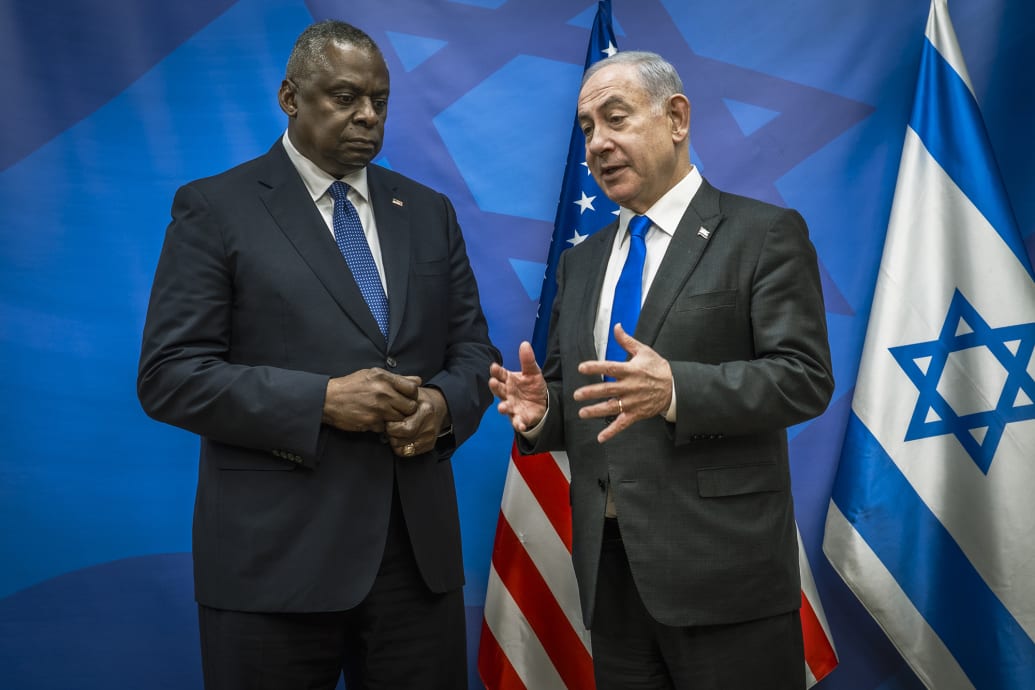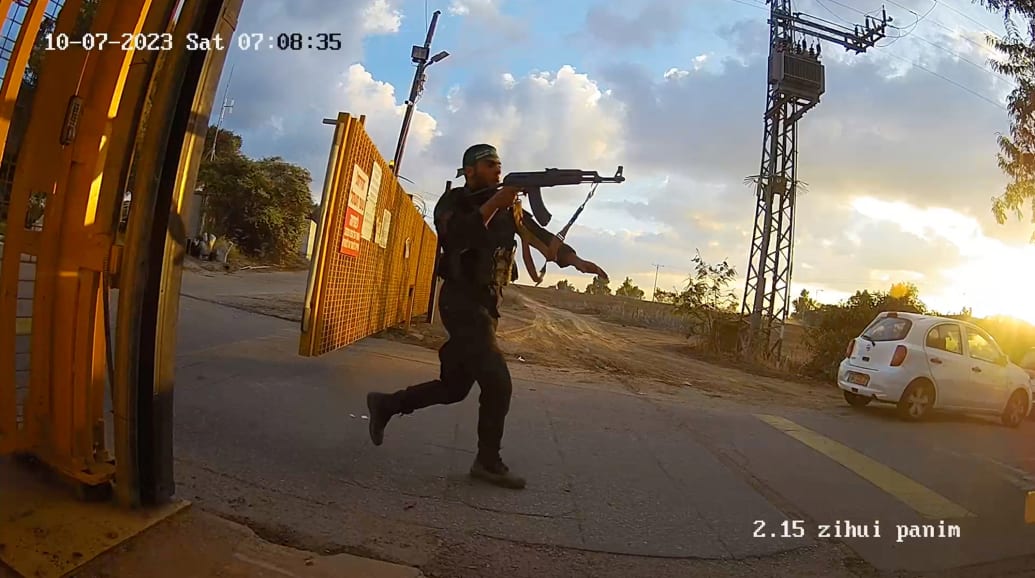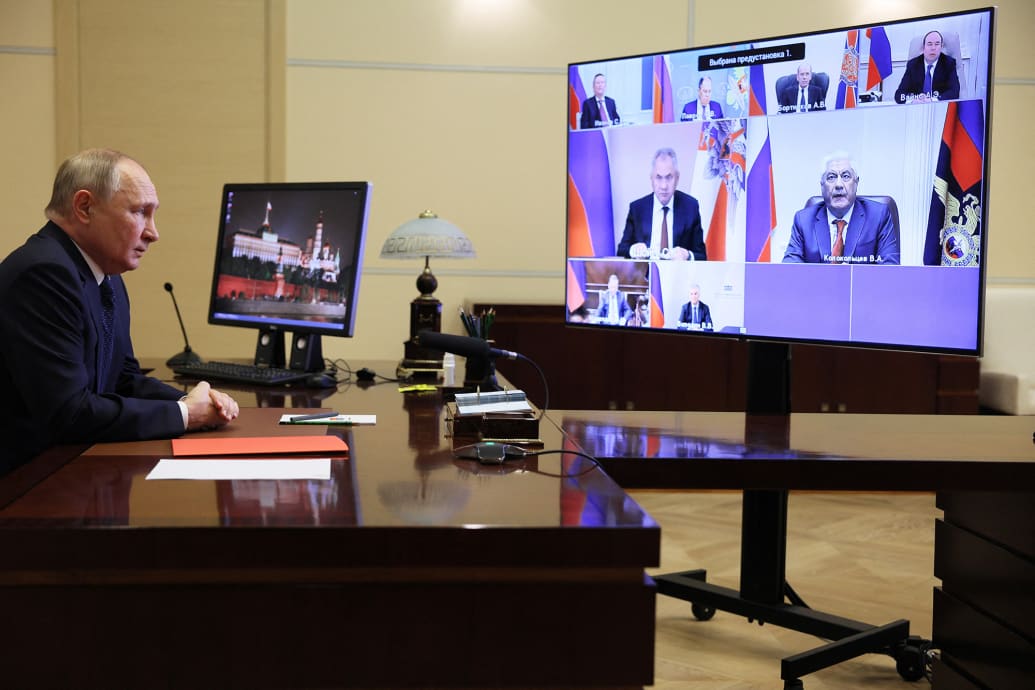It’s survival of the fittest in the global intelligence arena.

Photo Illustration by Thomas Levinson/The Daily Beast/Getty
The world’s leading spy agencies have been forced to reckon with the consequences of two major wars on different continents, raging simultaneously.
With Gaza descending into a hellscape of death and destruction under Israeli bombardment in recent weeks, and Europe’s largest ground war since World War II ongoing in Ukraine—intelligence agencies around the globe are reacting to the turmoil and shifting priorities of the moment.
In the Middle East, Israel’s world-renowned intelligence agencies have been lambasted for failing to foil Hamas’ planned attacks on Oct. 7, in which 1,200 people were killed and 200 others were taken hostage. In Russia, espionage operations abroad have suffered greatly following a tidal wave of expulsions by leaders of Western countries targeting Kremlin diplomats and suspected spies. China’s intelligence apparatus, meanwhile, appears to be expanding—likely to the detriment of the U.S., a longstanding target of Beijing’s espionage operations.
In The Art of War, legendary Chinese military strategist Sun Tzu wrote that “All war is based on deception,” and compared spies to water: “On them, depends an army’s ability to move.”
The question now is: Who’s swimming—and who’s sinking?
Israel
Right now, the Israeli intelligence apparatus is enormously taxed by efforts to track down hostages, collect intelligence, and hunt down Hamas in Gaza’s network of tunnels, said Norm Roule, the former national intelligence manager for Iran at the Office of the Director of National Intelligence.
“The demands placed on Israel’s intelligence service at present must be extraordinary. Imagine a system that is tasked with exploiting multi-INT collection and analysis, prisoner interrogations, laptops, documents, and battlefield reports all at a speed required to operationalize that information for an ongoing conflict,” Roule told The Daily Beast.
“It is clear that a review of Israeli intelligence coverage of Gaza will need to be undertaken,” Roule said.
Israeli intelligence agencies ought to undertake an analysis of what went wrong, but it needs to take place after the current blitz of conflict is over or at least died down, said Emily Harding, a former CIA analyst and former director for Iran on the National Security Council.
“Was the collection missing some part of the picture? Were the American analysts who were looking at the information, were the Israeli analysts who were looking at the information, not effectively questioning each other's assumptions?” Harding said. “We're not going to answer that for probably six months or more. But I suspect that in the final picture, there's going to be some quite worrying things.”

Secretary of Defense Lloyd J. Austin III meets with Israeli
Prime Minister Benjamin Netanyahu in Tel Aviv, Israel,
Oct. 13, 2023.
Chad J. McNeeley/Department of Defense
“I’m sure the Israelis are not thrilled to be [be dealing with] lots of questions asked of their folks,” Harding said. “It's going to be one of those moments where a certain degree of trust is lost, and you have to rebuild that by asking a lot of pointed questions in a time when nobody has time for pointed questions so I'm sure it's a bit tense.”
Despite the Oct. 7 failures, Israel’s performance taking out Hamas indicates it is still near the top of its game, said Roule.
“The failure of Israel to detect the Oct. 7 attacks should not diminish the strong and well-deserved reputations of Israel’s intelligence services. The efficiency associated with Israel’s ability to identify, locate, and eliminate Hamas leaders implies impressive intelligence targeting and the results of these operations are no doubt being watched with concern by Lebanese Hezbollah,” Roule said.

An armed man aims his rifle during the Oct. 7th attack by Hamas, in this screen grab from footage captured by a surveillance camera in Kibbutz Alumim, Israel, released on Nov. 20, 2023.
South First Responders/Handout via Reuters
On the other side, Hamas may continue to receive intelligence help from Iran, said Harding.
The Biden administration has said that there’s no clear evidence that Iran approved Hamas’ October 7 attack, although reports have circulated that Iranian security officials helped plan the attack. There are some suggestions that Iran was entirely clued into the plan: “The evidence in my mind seems to point to Iran and Hezbollah being somewhat surprised by what happened on Oct. 7, especially the scope of it,” Harding said.
But there’s a non-zero chance that Iran played a heavy hand in Hamas’ preparation for the attack, particularly given the level of planning and resources it took to set up.
“Looking at the weaponry that Hamas had, there had to have been a bunch of shipments into Gaza In the months beforehand. The extensive planning that they did… They didn’t do that on their own,” Harding said. “That I look at and I bet Iran and Hezbollah helped them with a lot of background information, and intelligence analysis that went into it and the planning.”
The United States
“It is extraordinary that the death of several dozen Americans at the hands of a U.S.-designated terrorist group has not warranted a statement by senior U.S. officials to the American people in which they take responsibility for failing to prevent these deaths,” Roule told The Daily Beast. “The lack of such a statement says much about how current policy makers view their responsibilities for national security and how we choose to respond to terrorism. Adversaries will note this silence.”
The United States intelligence apparatus has likely whirred into high gear behind the scenes, helping both Israel and analyzing what went wrong in the buildup to Oct. 7, said Roule.
Allies, including the United States, are likely offering Israel help processing data from Gaza and may also be able to jump in to handle issues Israel must address, but which may not be at the absolute top of the heap, said Roule.
Additionally, the U.S. intelligence community is currently working to help Israel understand what the regional reactions are to the Israel-Hamas war, Scott Berrier, the director of the U.S. Defense Intelligence Agency, said at a CSIS event early this month.
But while the United States is surging support, it must also undergo a vast analysis of what went wrong in the buildup to October 7.
“Given the lack of attention paid to these threats, building an effective enterprise will likely take more time than many expect,” Roule said, warning that American intelligence priorities still have China and Russia extremely high on the list as well. “As we tackle this challenge, we need to remind ourselves that the Russian and Chinese threats have not diminished.
Russia
That’s in part because Western countries have expelled over 600 Russian diplomats since Vladimir Putin’s war in Ukraine began, according to TASS, chipping away at Russia’s ability to conduct operations abroad.
In addition to that, the officers who have been expelled are expressing some major dissent toward the Russian government and how it has handled their resettlement in Russia in the meantime.
A number of expelled GRU officers signed a dissent letter early this month and sent it to the Kremlin to express displeasure and disappointment in Moscow for failing to properly help families who were expelled from European countries in the wake of invading Ukraine, according to The Insider.
They complain about the lack of jobs for them and their wives, for instance, and lament the lack of spaces in schools for their children.

Russian President Vladimir Putin chairs a meeting with members of the Security Council via video link at the Novo-Ogaryovo state residence outside Moscow, Russia on Nov. 16, 2023.
Sputnik/Gavriil Grigorov/Kremlin via Reuters
The signatories also express their anger at the press and the way journalists have been portraying Russian military intelligence during the war.
“Media outlets have published articles that accuse the officers of the Main Directorate of the General Staff of the Russian Federation of incompetence and inaction, sometimes even gross unprofessionalism,” the letter says, claiming that press outlets “fail to adequately portray the heroic deeds of their fallen comrades from the GRU assault brigades in Ukraine.”
The Insider redacted the names of the purported signatories, . .
Shannon Vavra
Got a tip? Send it to The Daily Beast here.





No comments:
Post a Comment